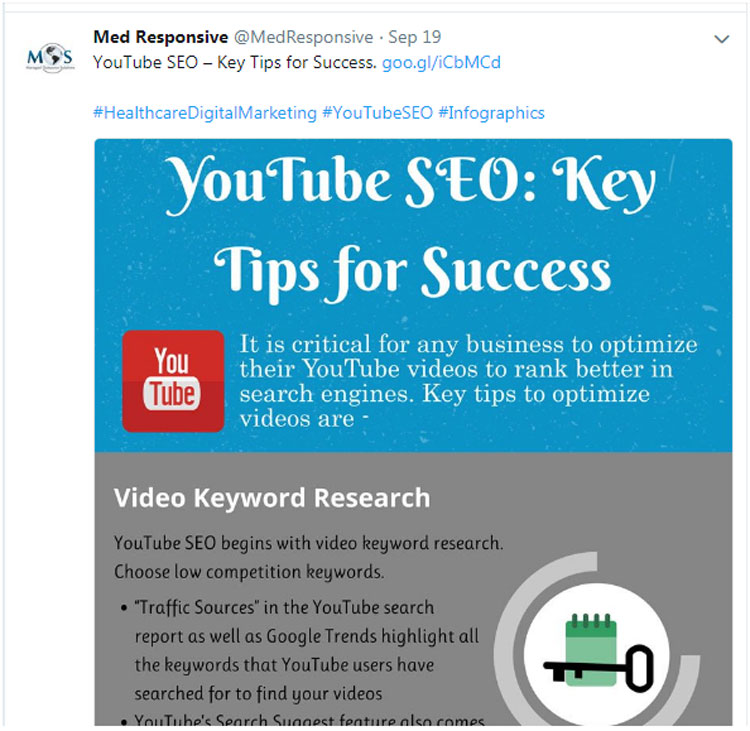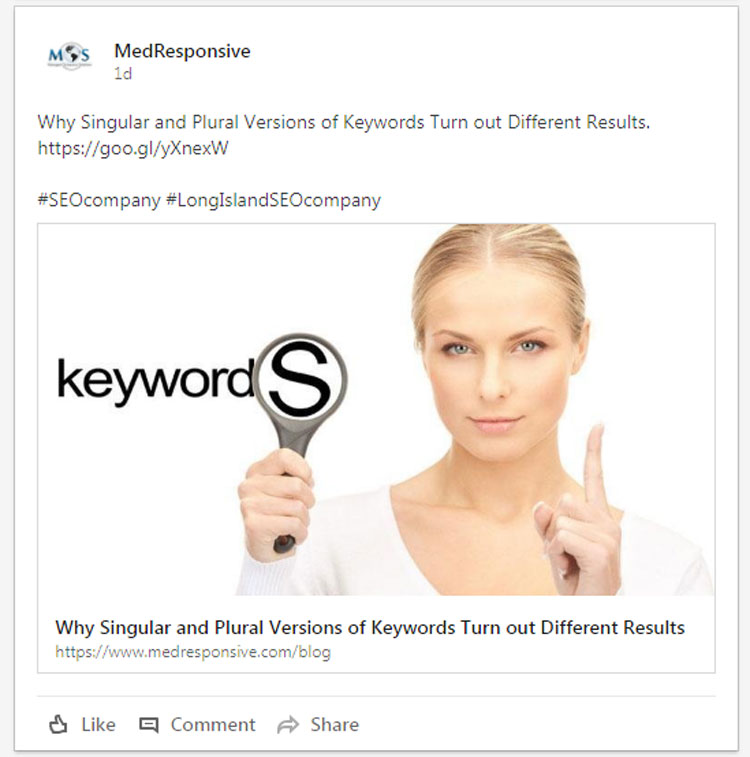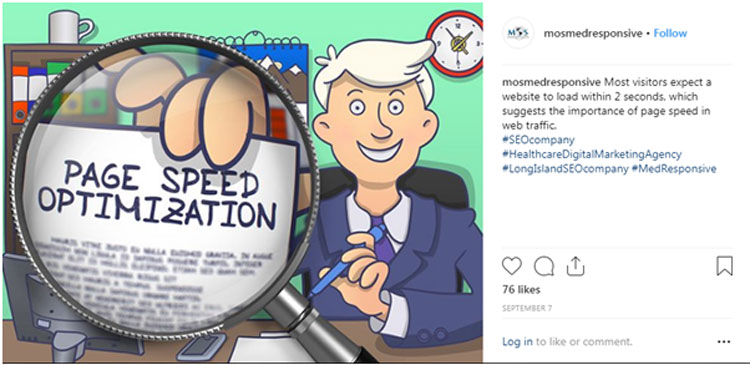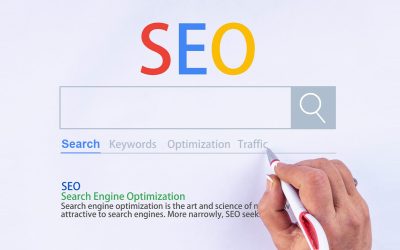Healthcare organizations and medical device industries are now very much aware of the value of digital healthcare marketing. Doctors are increasingly participating on multiple social media channels than ever before. Incorporating hashtags into social media posts has become a popular practice among medical entities as it gives more opportunities to place your content in Google search results. A hashtag is a word or phrase that is preceded by a hash sign (#) and it is used on social media websites and applications, prominently Twitter, to highlight messages on a particular topic. Using hashtags consistently will help to represent your expertise and what you stand for.
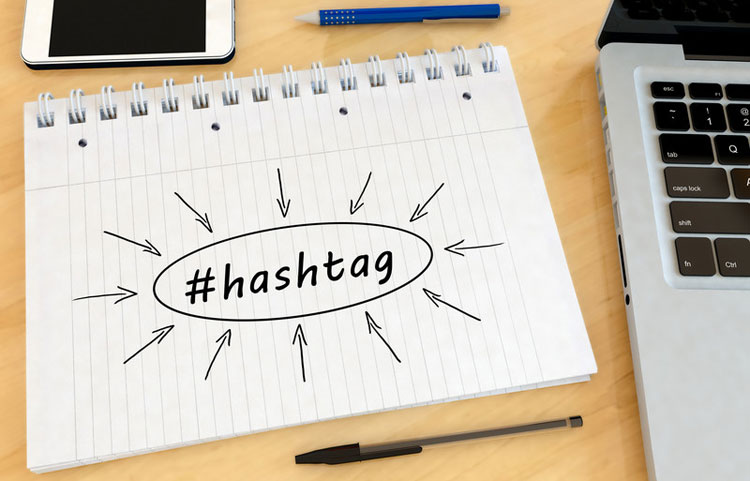
Hashtags are a great way of labelling and finding social media posts. It makes your content discoverable and also helps find relevant content from other people and businesses. Hashtags help to connect and engage with other social media users. Today, hashtags are used by business owners and managers in diverse industrial sectors.
In what ways are hashtags useful for social media marketing?
Branding: Hashtag use helps in branding. Many famous brands define themselves by creating their own and original phrases to improve their chances of standing out from other competitors. For example, Calvin Klein marks all of their commercials and publications with the hashtag #myCalvins. Similarly, Michael Kors is distinguished by their hashtag #instaKors that also enables buying a product easily from the picture holding that phrase. It facilitates browsing products and shows that the brand stays up to date with the client’s needs.
Event marketing: Hashtags are widely used for event marketing and it is one of the easiest ways to gather all the mentions on a given event than using one specific hashtag. It helps to receive updates on how the event is being received, share information, remarks and posts, and also to ask and answer questions.
Here are some examples of event marketing hashtags on LinkedIn:
#events
#eventtech
#eventmanagement
#eventprofs
#eventmarketing
#eventplanninng
#eventbusiness
#eventplatform
On Twitter, you have the following hashtags:
#videostreaming
#audiovisual
#livestream
#eventplanner
#eventplanning
#events
#eventprofs
#eventtech
#eventmarketing
#eventmanagement
#eventmeeting
#meetingprofs
#eventtechtalk
#VR
#AR
#AI
#mixedreality
#socialwall
#chatbots
On Instagram, you have the following popular event hashtags:
#aeprofs
#event
#events
#eventplanning
#eventprofs
#eventprofs
#eventtech
#staffing
#meetingprofs
Social media reach: When hashtags are used, it helps people looking for a specific content or publication on a subject to find it easily. Businesses can use hashtags that exactly match their brand and also the particular subject, which ensures that their posts are shown in the browser.
Social media campaigns: Many businesses now use hashtags to generate traffic, for tracking results and also for promoting campaigns. In 2017, Heineken created a social campaign and a flagship hashtag (#OpenYourWorld) simultaneously. In this campaign, people from all over the world were asked to do a series of tasks together. They shared opinions, views and Heineken offered them to share their differences. Within a week, the video had three million views and 500 thousand shares.
User-generated social media content: Brands want to be found by their targeted customers easily and it is also important for customers to be able to find specific content easily. User generated content is a great attraction on social media platforms that makes your account authentic and interesting. Travel companies for example, can run ongoing campaigns using hashtags they have created and encourage users to publish pictures of different places they are visiting or staying in with a chosen hashtag. The best of such user-generated content can be selected and posted on the company’s social media pages.
How to use hashtags in different social media platforms?
Many people believe that any number of hashtags can be used and it should be present everywhere. But there are places where hashtag use should be restricted or abandoned. So here is how hashtags should be used.
- Twitter
Hashtags originated from Twitter around 10 years ago, but it is still important today as an important aspect of communication on this platform. However, the rules, regulations and algorithm about applying hashtag have changed drastically. Today, hashtags are recommended to be used only once or twice per tweet. The number of hashtags can be increased but it also increases the chance of drastically reducing them.
- LinkedIn
Using hashtags is somewhat new in LinkedIn but the platform administrators encourage using them. So use hashtags everywhere, in the description of your profile, in posts, articles, comments, articles on LinkedIn Pulse on private and company websites and so on. On LinkedIn you can use it anywhere and everywhere and it pays off. When you look at how LinkedIn currently rewards its active users with increased reach, it is an additional boost with hashtags. Another advantage is that it becomes much easier to be found within the context of the topics and discussions that are engaging.
- Facebook
Hashtags are not used here. If hashtags are used, it becomes difficult to find such posts, and sometimes the posts are made almost invisible. - Instagram
It is a much younger platform than Twitter, but both marketers and its users claim it to be an attractive place to use hashtags. Instagram allows and even recommends using more of hashtags in the description. Some researchers have shown that the optimal number of hashtags to be used on one post is 11. But it is important to be careful not to use hashtags from Instagram’s blacklist. The penalty for the use of black list hashtags is “shadowban” or blocking photos that contain hashtags. According to Instagram’s managers, spammy, inappropriate, and offensive threads will be blocked. However, sometimes the phrases that are blocked do not seem provocative at all.
What are the tools available for using the right hashtags?
People use hashtags in many different ways. Choosing something that is between very popular and niche is the ideal method. Since hashtags are used everywhere, there are chances of being unnoticed among thousands of similarly tagged posts. Using a hashtag that is very unlikely can be risky but if you are trying to build a brand’s unique hashtag, then it becomes useful. The following are some of the different tools that help you to use hashtags on social media.
- Hashtagify is a free tool that helps analyze the most attractive hashtags at the initial stage of their search.
- TweetReach is another tool that requires no payment but it is a bit more extensive.
- Rite tag is a tool that lets you choose the right hashtags for the campaign and with its entire integration package. It also helps in their implementation.
- DrumUp is a tool that has more options, with hashtag curations being one of them. This tool helps to support you in managing social media communications on a broader scale.
- Trendsmap is a tool that shows the most popular hashtags in a given location. This tool also lets you see what topic is highly popular in a given area.
- Brand24 is a tool that lets you monitor all hashtags that are significant, in terms of both your brand and your competition. At the same time, it also shows the phrases that are the most popular among the audience.
Hashtags are very powerful in improving and strengthening brand communication. Use of hashtag with your keywords not only represent your field of expertise but also become an expression that individuals will start relating to. Hospitals, medical practices, surgery groups, clinics, medical device marketers and others in the healthcare business sector can make effective use of the latest healthcare digital marketing techniques including hashtag use with the assistance of medical SEO services. They will ensure that you use the appropriate hashtags associated with your brand and encourage your audience to use them. They will also check what hashtags your competitors are using.


